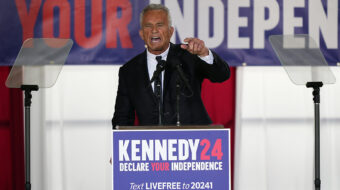An ongoing guerilla war is raging in Southeastern Turkey and Kurdish regions of U.S.-occupied Iraq. The war is led by the Kurdistan Workers Party (PKK), which since its inception in Turkey has fought for a socialist Kurdistan that would bring together oppressed Kurdish minorities from contiguous regions. As I see it, the events are a textbook case of how imperialism cynically operates to divide and exploit peoples.
Kurds are a people who trace their history to biblical times. They have risen up over and over again against powerful pre-capitalist empires, centered in recent centuries in Turkey and Iran, which oppressed them. Today there are an estimated 25 million Kurds, the majority — 50 percent to 65 percent — in Turkey, followed by Iran, Iraq and Syria
After World War I, Kurdish people fought for independence and self-determination, believing that it had been promised to them by the Allied powers. They, along with other peoples, soon discovered that “self-determination” was meant for Europeans, not for them.
Mustapha Kemal’s nationalist regime in Turkey, the new British colonial regime in Iraq and the Iranian monarchy all worked to suppress Kurdish rebellions. Britain, like the U.S. today, maintained the fiction that it was preparing Iraq for self-governance and even had its Iraqi colony admitted to the League of Nations in the 1930s at a time when Iraqi forces massacred Kurds demanding self-determination.
Turkish policies toward Kurds, suppressing the Kurdish language, literature and press, were particularly brutal. These policies, while they have been moderated, continue to this day.
After its founding in Turkey in the 1970s, the PKK adopted various strategies rooted in assassinations, bombings and later “people’s war” tactics associated with the Chinese revolution. The PKK also faced relentless repression by the Turkish military and police.
In the aftermath of the dismemberment of the Soviet Union, the PKK moved away from Marxism-Leninism, although it still defines itself as seeking a socialist Kurdistan. At the same time, it extended its people’s war tactics to suicide bombings and attacks against Turkish embassies and officials abroad, leading the U.S., NATO and the European Union to officially declare it a terrorist organization.
Where does the U.S. — which has never defended Kurds’ human rights in Turkey and supported Saddam Hussein in the 1980s while he was massacring Iraqi Kurds — fit into all of this?
Hussein’s Baath regime offered Kurdish Iraqis a very limited autonomy over territories in the north, but excluded some of the richest lands and most importantly all of the oil lands, and used both chemical warfare and mass killing to crush resistance. Between the first Gulf War and the 2003 U.S. invasion, U.S.-NATO protection enabled Iraqi Kurds to gain significant autonomy.
The PKK has used, and continues to use, Iraq’s Kurdish region as a base for its extensive “people’s war” in southeastern Turkey. With one hand U.S. military and intelligence services cooperate with Turkish forces in attacks against the PKK in Turkey and Iraq. With the other the U.S. tries to control attacks in Iraq so as not to upset its strategic position or overly humiliate its dependents in Bagdad, and in order to try to sustain long-term control over the Kurdish oil region. Kurds, Turks and Iraqis who perish in this conflict, often as innocent bystanders, mean little to the contending parties and nothing to U.S. imperialism.
The welfare of Kurds in either Turkey or Iraq, and the future of democracy in either Turkey or Iraq, have absolutely nothing to do with these calculations.
Bringing Iran, Iraq, Syria and Turkey together with Kurdish representatives to conclude a regional settlement that will include cooperative economic development and political and cultural civil rights is the only real basis for a solution to this bloody conflict. Neither the Bush administration nor its predecessors have ever contemplated such a settlement, preferring to control oil and use Turkish military might for their own purposes.
A progressive U.S. government should advance such a settlement, and reject the classic imperialist policy that sees Kurds as pawns, Turkey and Iran as knights, and the oil of the region as king on a chessboard.
As a postscript, the only state in which a Kurdish minority was given full cultural freedom and equal rights was Soviet Armenia. After the dismemberment of the Soviet Union, these rights were largely lost, another example of how the Soviet Union’s destruction strengthened imperialism and undermined people’s rights.
Norman Markowitz is a history professor at Rutgers University.












Comments